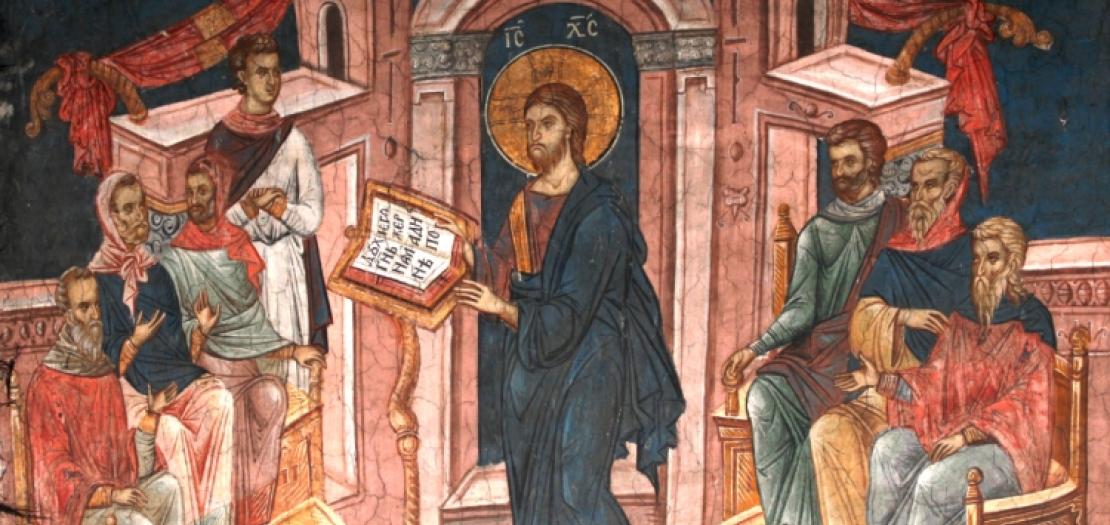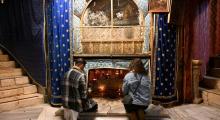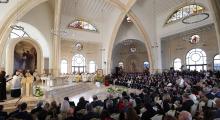Issued by the Catholic Center for Studies and Media - Jordan. Editor-in-chief Fr. Rif'at Bader - موقع أبونا abouna.org

Following is the text of the meditation by His Beatitude Cardinal Pierbattista Pizzaballa, Latin Patriarch of Jerusalem, for the fifth Sunday of ordinary time B, dated February 4, 2024:
"Everyone is looking for you" (Mark 1:37). These are the words that the first disciples say to Jesus when they find him, having set out on his trail (Mark 1:36); they had noticed that Jesus, early in the morning, had left Capernaum and withdrawn to a deserted place to pray (Mark 1:35), and they had gone looking for him so that the expectations of many would not be disappointed.
To seek him, to set out on his trail, is the work of man.
But today's Gospel (Mark 1:29-39) tells us about another search, which is Jesus' own search, which seems to set out on the trail and go in search of all those who need Him.
We have already seen this, last Sunday, in the synagogue at Capernaum (Mark 1:21-28): Jesus enters it and immediately encounters a man who needs to be set free. No one else could have done it but Jesus, because the unclean spirit possessed that man and no word was so authoritative as to take his place. No one else but Jesus could claim an exclusive relationship with the man possessed by the unclean spirit to the extent that he could cast out the abusive inhabitant.
Today Jesus enters a house, Simon's (Mark 1:29) and finds his mother-in-law there stuck in bed with a fever.
No longer a profound alienation, as seen in the synagogue, but a simple illness: to say that it takes little for man to be impeded in his desire for life, to say how fragile human nature is.
After healing the woman, it is the whole city that brings every illness and weakness to Jesus. And Jesus takes care of everyone. (Mark 1:32-34)
Jesus, then, enters a synagogue, a house, a city, and goes in search of all the frail, the excluded, the poor: He draws them to Himself, He is the one who goes looking for them. And when He has found them, He cannot but go elsewhere (Mark 1:38) to look for others, for He knows how much frailty and how much evil inhabits the homes and cities of men.
If we want to find God, then, we must learn to look for Him in that "elsewhere" that is our frailty, because that is where He comes looking for us.
Not in our great professions of faith, not in our supposed coherence, but in the poor reality of our lives.
But there is a second place where it is clear that Jesus makes himself present, where therefore we can seek him, namely in the solidarity that arises among people when they all make contact with the poverty that inhabits them.
In today's Gospel we find no less than two moments when there is someone who takes the pain of others to heart: Jesus enters Simon's house, and immediately they tell him about his mother-in-law in bed with a fever. (Mark 1:30) And, in the evening there is someone who brings him all the sick and the possessed. (Mark 1:32)
Our relationship with God has this enormous possibility, that of being a family relationship, in which we can talk to Him and we can bring to Him all that we hold dear. And if it is true that He always listens, all the more does He listen when we bring to Him not only our own pain but also that of those we hold dear. There the Lord certainly makes Himself present, there we can seek Him without fear that He is elsewhere.
Every other expectation, every one of our seeking the Lord in places that are not those of our frailty and solidarity, risk instead not bringing us to the Lord, just as we see at the end of today's Gospel (Mark 1:36-37): in Mark's Gospel, this search for Jesus is frequently associated with a desire to stop Jesus, to possess Him, to keep Him close to us.
On the contrary, Jesus does not possess and does not want to be possessed: no one can claim to have exclusivity over Him.
The pursuit of Him is not aimed at having Him all to oneself, but rather is fulfilled in the attitude we see in Simon's mother-in-law, who, having been healed of her fever, got up and began to serve. (Mark 1:31)
The healing that Jesus works in us is not simply that of those who want to make us well.
True healing is that which makes us like Him, that is, able to get up and go elsewhere, seeking out anyone who needs our presence and service.
This is the form of gratitude that Jesus loves and awaits from us.
+Pierbattista
 Jerusalem: Augusta Victoria Hospital offers free treatment for Gaza children diagnosed with leukemia
Jerusalem: Augusta Victoria Hospital offers free treatment for Gaza children diagnosed with leukemia  Text of meditation by Cardinal Pizzaballa, Latin Patriarch of Jerusalem, for second Sunday of Christmas
Text of meditation by Cardinal Pizzaballa, Latin Patriarch of Jerusalem, for second Sunday of Christmas 




